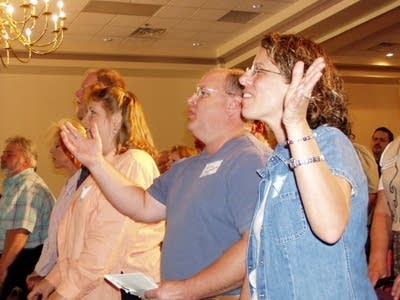Mobilization of the faithful is a two-party affair

On a sunny August morning, more than 100 evangelical ministers and their spouses gathered at an Arden Hills church for an event sponsored by Focus on the Family. The group's vice president of pastoral ministries, H.B. London, asks the gathered pastors to join him in a favorite hymn.
Eventually, the topic turns to politics, and getting conservative voters to the polls. Tom Minnery, senior vice president of public policy for Focus on the Family Action, tells the ministers that citizens have an obligation to vote, and that churches should speak out against abortion and same-sex marriage.
"It is not right that his sacred creation, a human being, should have its life snuffed out before that human being ever has a chance to be born," he says. "It is not right that his definition of marriage, which has served civilization down through the centuries - Christian and non-Christian - that God's plan for that family be erased. And that is what's happening today. These things are not right."

Minnery's group can legally lobby on political issues. Focus on the Family can't.
Create a More Connected Minnesota
MPR News is your trusted resource for the news you need. With your support, MPR News brings accessible, courageous journalism and authentic conversation to everyone - free of paywalls and barriers. Your gift makes a difference.
Pastors at the meeting received packets of election information from a conservative Minnesota group, the Minnesota Family Institute. The organization is the educational, tax-exempt arm of the Minnesota Family Council. The packets included posters that say "Vote your Values," and a voter guide that has non-partisan information on issues and candidates.
Pastors also received a list of legal do's and don'ts, so that they won't jeopardize their churches' tax-exempt status.
One of the pastors at the event was Paris Pasch of Christ's Family church, a non-denominational church in Hastings. Pasch says he tries to inspire the members of his congregation to vote and learn about the issues. He says he is opposed to abortion and gay marriage, but he tries not to be partisan. Pasch says his members come from across the political spectrum, so even though he tells them to vote, he doesn't expect them to vote as he would.
"After giving them a biblical mandate and then a biblical perspective, I would encourage them to vote what they believe in, because it's far better off if they're speaking what's inside of them, they're going to carry that through every other component of their life," Pasch says.
As conservative Christians try to mobilize voters, churches with a more liberal stance on the issues are also working to get out the vote. One coalition of churches has a project that aims to register voters in the 10 lowest-turnout precincts in Minneapolis and St. Paul.
In a state with the highest voter turnout in the country, turnout in these 10 precincts hovers around 20 percent - less than a third of the state wide average.
The Interfaith Participation Project will try to get voters in those precincts to the polls on election day. One of the organizers is Baptist minister David Everett, who says church leaders in those areas will knock on doors and hand out voter information later this month.
"I think that establishes credibility in what we're trying to do, but then also, it solicits immediate buy-in. If this pastor can talk to me about this, it must be important, or this must be something I should get involved in, because community leader so-and-so was involved in this, and I think that goes a long way, a very, very long way, much more than just standing from the pulpit on Sunday mornings," Everett says.
Everett says many of the voters in these precincts are low-income people of color, who have given up on the political system. He says they tend to be more concerned about economic than social issues like abortion or gay marriage.
Everett says these areas have traditionally voted DFL, but he thinks party loyalty has dwindled for many voters. So while religious leaders on both the right and the left are trying to get parishioners to the polls, there's no guarantee those churchgoers will vote the way their church leaders are hoping.
